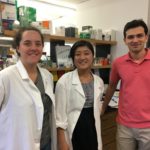Research Updates
ALANI LAB: Our research group continues to be engaged in three areas of research which have made significant progress in the past year: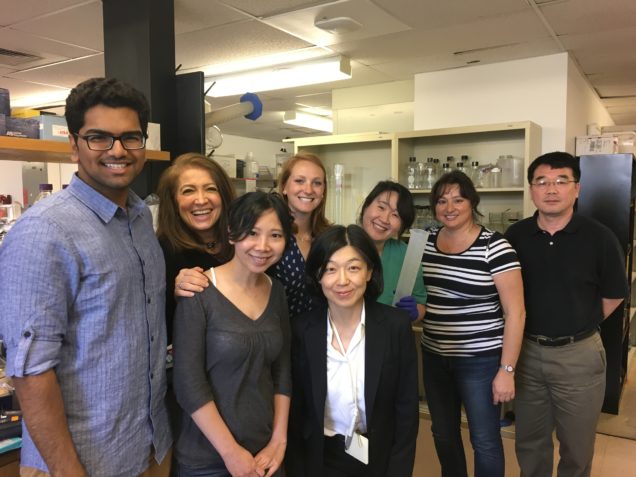 (1) Epigenetic alterations in melanoma and relevant targeted therapies; (2) Defining molecular mediators of melanoma development and progression and their use as diagnostic/prognostic biomarkers; (3) Understanding cellular communication networks within the tumor microenvironment for melanoma. We are currently in the process of writing up several interesting studies including work on the novel cell surface receptor, NRP2 and its role in melanoma progression and its potential function as a unique biomarker for melanoma, as well as studies on novel epigenetic targeting strategies for cancers and other diseases. We continue to work collaboratively with colleagues in Biomedical Engineering to explore novel biomarker detection platforms for melanoma and other cancers, as well as unique microfluidic systems to understand melanoma progression and metastasis through malleable in vitro model systems.
(1) Epigenetic alterations in melanoma and relevant targeted therapies; (2) Defining molecular mediators of melanoma development and progression and their use as diagnostic/prognostic biomarkers; (3) Understanding cellular communication networks within the tumor microenvironment for melanoma. We are currently in the process of writing up several interesting studies including work on the novel cell surface receptor, NRP2 and its role in melanoma progression and its potential function as a unique biomarker for melanoma, as well as studies on novel epigenetic targeting strategies for cancers and other diseases. We continue to work collaboratively with colleagues in Biomedical Engineering to explore novel biomarker detection platforms for melanoma and other cancers, as well as unique microfluidic systems to understand melanoma progression and metastasis through malleable in vitro model systems.
Relevant publications:
- Moriarty WF1, Kim E, Gerber SA, Hammers H, Alani RM. Neuropilin-2 promotes melanoma growth and progression in vivo. Melanoma Res. 2016 Aug;26(4):321-8.
- Zhang C, Barrios MP, Alani RM, Cabodi M, Wong JY. A microfluidic Transwell to study chemotaxis. Exp Cell Res. 2016 Mar 15;342(2):159-65.
- Zhang C, Shenk EM, Blaha LC, Ryu B, Alani RM, Cabodi M, Wong JY. A simple engineered platform reveals different modes of tumor-microenvironmental cell interaction. Biofabrication. 2015 Dec 30;8(1):015001.
LABUNSKY LAB: The research in our lab is focused on studying the molecular and genetic mechanisms 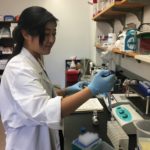 underlying the aging process, with the goal of utilizing this knowledge to develop novel therapies for age-related diseases. In our work, we utilize next-generation sequencing (RNA-seq and Ribo-seq) and a combination of novel computational and biochemical approaches to pursue quantitative analysis of the factors that lead to or accompany aging in living organisms.
underlying the aging process, with the goal of utilizing this knowledge to develop novel therapies for age-related diseases. In our work, we utilize next-generation sequencing (RNA-seq and Ribo-seq) and a combination of novel computational and biochemical approaches to pursue quantitative analysis of the factors that lead to or accompany aging in living organisms.
LANG LAB: Dr. Deborah Lang and her laboratory have joined the Boston University Department of Dermatology research group. Dr. Lang, appointed as an Associate Professor of Dermatology, was recruited from the University of Chicago. Here at BU, she will continue her basic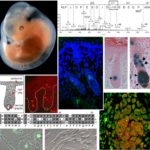 science research mission focusing on the molecular and cellular biology of melanoma. The lab’s research is centered on studying processes that occur during pigment cell development of the embryo and applying these findings toward melanoma. The premise is that pathways that are essential for development (such as growth, survival, and migration) are also important for melanoma progression (over-growth, inappropriate survival, and metastasis). Deborah moved to Boston with her graduate student, Jason Lui, M.S., who is still currently enrolled in the Developmental Biology Program at the University of Chicago. Deborah has also recruited two postdoctoral associates to her new Boston laboratory: Jennifer La, Ph.D., a recent University of Chicago graduate from the Molecular Pathology graduate program, and Yougang Zhai, Ph.D., who was recruited from Loyola University and is a graduate of the Chinese Center for Disease Control and Prevention and Peking Union Medical College. Currently, the lab has two part-time students: Sebastian Herrera, a rising second-year student at Boston University School of Medicine, and Adil Haresi, a recent graduate of Massachusetts College of Pharmacy and Health Science.
science research mission focusing on the molecular and cellular biology of melanoma. The lab’s research is centered on studying processes that occur during pigment cell development of the embryo and applying these findings toward melanoma. The premise is that pathways that are essential for development (such as growth, survival, and migration) are also important for melanoma progression (over-growth, inappropriate survival, and metastasis). Deborah moved to Boston with her graduate student, Jason Lui, M.S., who is still currently enrolled in the Developmental Biology Program at the University of Chicago. Deborah has also recruited two postdoctoral associates to her new Boston laboratory: Jennifer La, Ph.D., a recent University of Chicago graduate from the Molecular Pathology graduate program, and Yougang Zhai, Ph.D., who was recruited from Loyola University and is a graduate of the Chinese Center for Disease Control and Prevention and Peking Union Medical College. Currently, the lab has two part-time students: Sebastian Herrera, a rising second-year student at Boston University School of Medicine, and Adil Haresi, a recent graduate of Massachusetts College of Pharmacy and Health Science.
The research goals of the Lang Lab are to discover innovative and effective treatments for melanoma by targeting innate pathways that occur during normal melanocyte development and stem cell maintenance. We find that the normal molecular processes that regulate cellular differentiation, homeostasis, growth, and migration of adult and embryonic melanocytes are corrupted during melanoma tumorigenesis, progression, and metastasis. The discovery of these molecular pathways and knowledge on how they function will reveal new targets for future melanoma therapies.
RYU LAB: Our research group is interested in determining the molecular events that dictate melanoma tumorigenicity and malignant progression. It is likely that identification of such molecular pathways will allow the investigators to identify clinically useful biomarkers as well as potential therapeutic targets against this lethal form of skin cancer.
Relevant publication: Hwang S, Kim HE, Min M, Raghunathan R, Panova IP, Ryu B. Epigenetic Silencing of SPINT2 Promotes Cancer Cell Motility via HGF-MET Pathway Activation in Melanoma. J Invest Dermatol. 2015 Apr 24. Doi: 10.1038/jid.2015.160.
SHAROV LAB: The Sharov Research Team investigates epigenetic mechanisms controlling gene expression in skin development and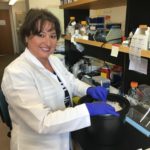 homeostasis. Epigenetic regulatory mechanisms play a key role in the control of gene activation and silencing during epidermal development and keratinocyte differentiation. Execution of epidermal and hair follicle–specific differentiation requires a high degree of coordination between distinct levels of chromatin organization including covalent DNA/histone modifications, higher-order chromatin remodelers and tissue-specific transcription factors in skin. Using various experimental approaches including ChIP-Seq, Bisulfite sequencing, immunohistochemistry, 3D-FISH, chromosome conformation capture and in vivo mouse models we are currently exploring how epigenetic machinery operates in concert with p63, Lsh and CTCF proteins to control gene expression in skin epithelial progenitor cells during their differentiation into specialized cell lineages during normal development, in response to injury and tumorigenesis.
homeostasis. Epigenetic regulatory mechanisms play a key role in the control of gene activation and silencing during epidermal development and keratinocyte differentiation. Execution of epidermal and hair follicle–specific differentiation requires a high degree of coordination between distinct levels of chromatin organization including covalent DNA/histone modifications, higher-order chromatin remodelers and tissue-specific transcription factors in skin. Using various experimental approaches including ChIP-Seq, Bisulfite sequencing, immunohistochemistry, 3D-FISH, chromosome conformation capture and in vivo mouse models we are currently exploring how epigenetic machinery operates in concert with p63, Lsh and CTCF proteins to control gene expression in skin epithelial progenitor cells during their differentiation into specialized cell lineages during normal development, in response to injury and tumorigenesis.
